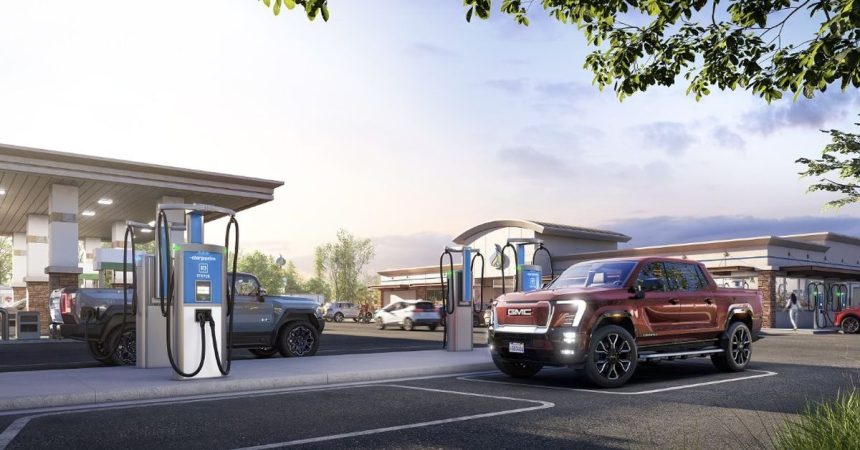General Motors (GM) and ChargePoint, a leading electric vehicle (EV) charging network provider, have embarked on a strategic partnership to revolutionize the EV charging landscape in the United States. Their ambitious plan entails the deployment of up to 500 direct current (DC) fast-charging stations across the country by the end of 2025. These stations will be strategically located to maximize accessibility and convenience for EV drivers, aiming to alleviate range anxiety and accelerate the adoption of electric vehicles. The collaboration leverages the expertise of both companies, combining GM’s automotive prowess with ChargePoint’s established charging infrastructure network. This joint effort represents a significant step towards building a robust and comprehensive charging ecosystem, crucial for supporting the growing number of EVs on the road.
A key feature of the planned charging stations is their utilization of cutting-edge technology. Many will be equipped with ChargePoint’s Express Plus platform, capable of delivering charging speeds up to an impressive 500kW. This ultra-fast charging capability drastically reduces charging times, allowing drivers to quickly replenish their vehicle’s battery and continue their journeys with minimal interruption. This addresses a major concern for potential EV buyers, who often cite long charging times as a barrier to adoption. By deploying these high-powered chargers, GM and ChargePoint are directly tackling this issue and promoting the practicality of electric vehicles for everyday use.
Furthermore, the charging stations will feature ChargePoint’s Omni Port hardware, a versatile solution designed to accommodate both the Combined Charging System (CCS) and Tesla’s North American Charging Standard (NACS) ports. This compatibility eliminates the need for adapters, simplifying the charging process for drivers regardless of their vehicle’s charging port configuration. This interoperability is critical for a cohesive charging experience, avoiding fragmentation and ensuring that all EV drivers can access the network seamlessly. This forward-thinking approach demonstrates a commitment to inclusivity and promotes the broader adoption of EVs across various brands.
The strategic placement of these charging stations is a crucial element of the plan. While the specific locations haven’t been publicly disclosed, the emphasis is on placing them in “strategic” areas. This suggests a focus on high-traffic corridors, popular destinations, and areas with limited existing charging infrastructure. By carefully selecting locations based on driver needs and traffic patterns, GM and ChargePoint aim to maximize the utilization of the network and provide convenient access for EV drivers across the country. This strategic deployment will contribute significantly to alleviating range anxiety and promoting long-distance EV travel.
The collaboration between GM and ChargePoint carries significant weight within the automotive and EV charging industries. GM’s commitment to electrifying its vehicle lineup, coupled with ChargePoint’s extensive experience in developing and managing charging networks, creates a powerful synergy. This partnership is not just about installing charging stations; it represents a broader commitment to fostering the growth of the EV ecosystem. By working together, these two industry leaders are sending a strong signal about the future of mobility and accelerating the transition to electric transportation.
The implications of this partnership extend beyond just the immediate benefits of increased charging availability. It represents a crucial step towards establishing a robust and reliable national charging network, essential for widespread EV adoption. The rapid deployment of these high-powered, versatile charging stations will significantly enhance the convenience and practicality of owning and operating an electric vehicle. This initiative is a significant contribution to the ongoing transformation of the transportation sector and will play a pivotal role in accelerating the shift towards a more sustainable and electrified future.



